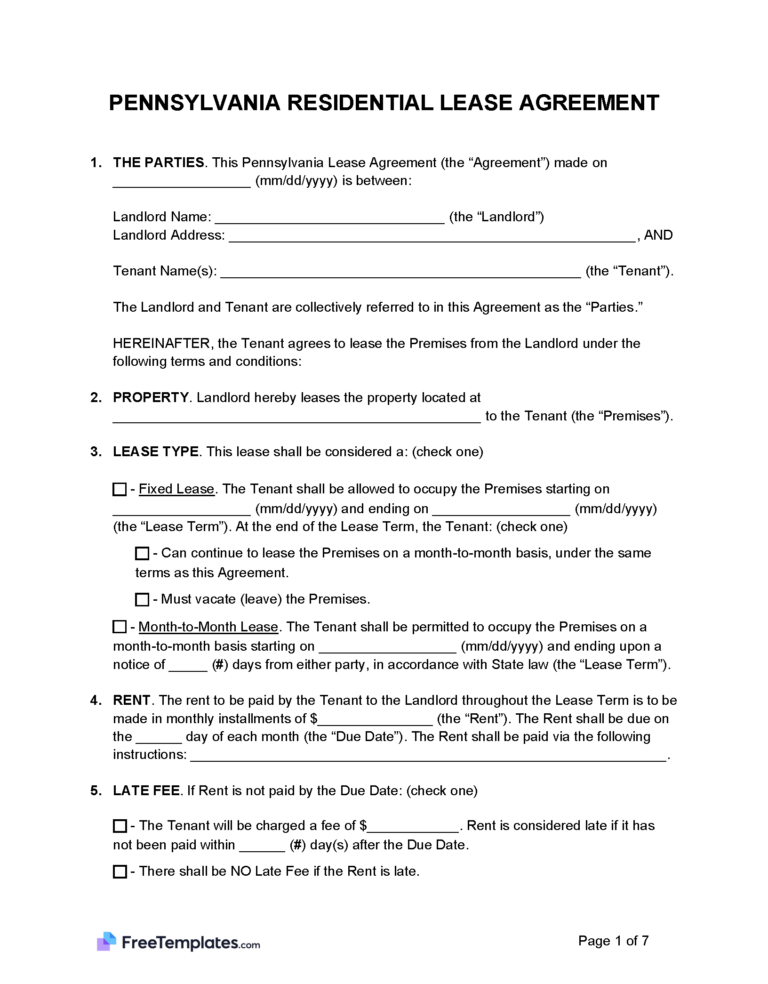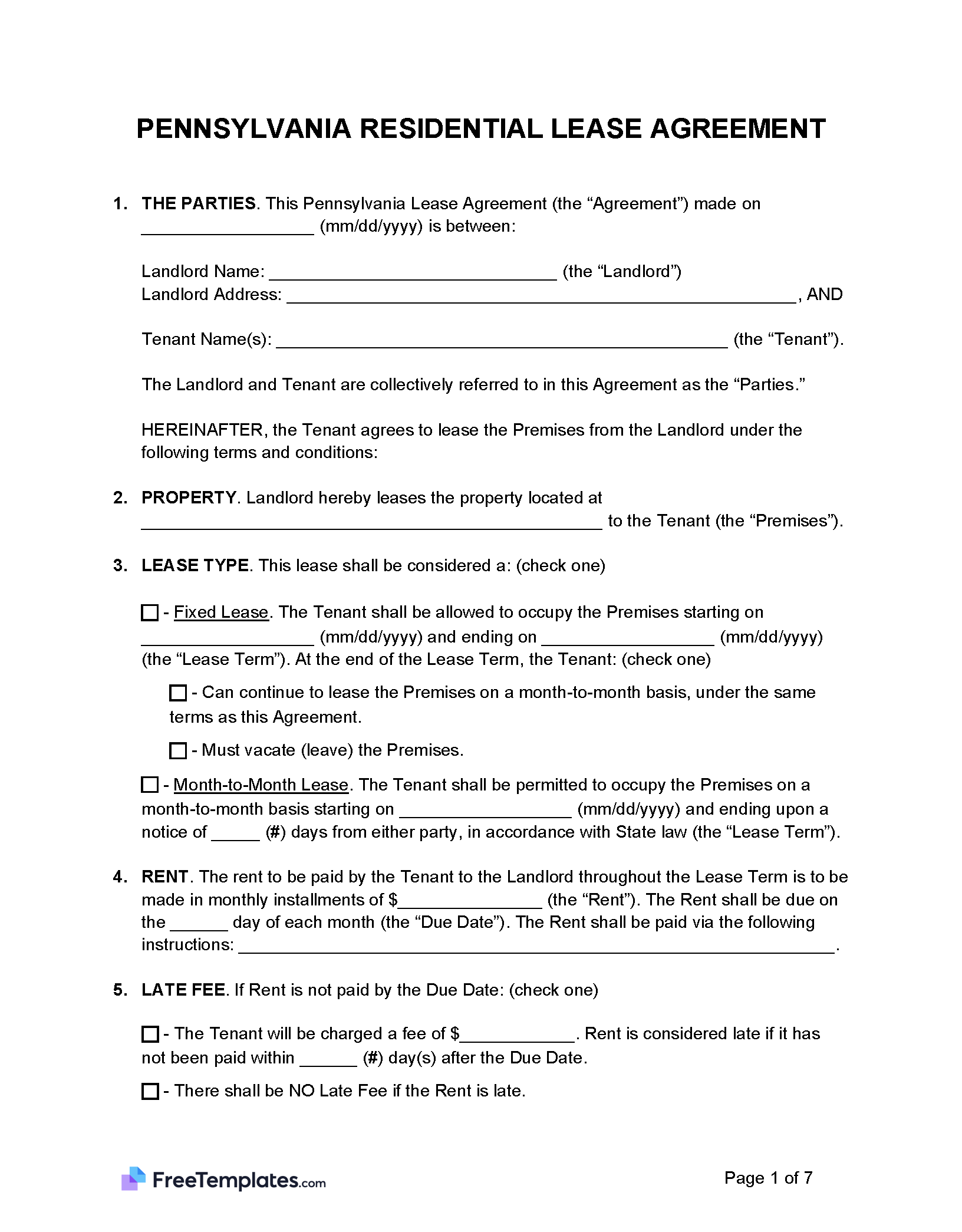By Type (6)
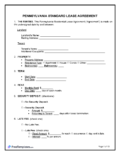 Standard Lease Agreement – Generally, a 12-month lease between a landlord and tenant for the use of a residential space. Standard Lease Agreement – Generally, a 12-month lease between a landlord and tenant for the use of a residential space.
|
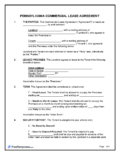 Commercial Lease Agreement – Unlike a standard lease agreement, this document is for when a business rents a space from a landlord. Commercial Lease Agreement – Unlike a standard lease agreement, this document is for when a business rents a space from a landlord.
|
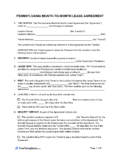 Month-to-Month Lease Agreement – After the tenant pays the landlord, this rental agreement renews and has no specific termination date. Month-to-Month Lease Agreement – After the tenant pays the landlord, this rental agreement renews and has no specific termination date.
|
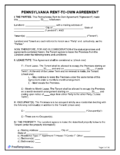 Rent-to-Own Agreement – This is similar to a standard lease agreement but with the added benefit of allowing the renter to purchase the property from the landlord. Rent-to-Own Agreement – This is similar to a standard lease agreement but with the added benefit of allowing the renter to purchase the property from the landlord.
|
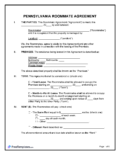 Roommate Agreement – For two individuals sharing a leased space to outline the duties and responsibilities of each tenant. Roommate Agreement – For two individuals sharing a leased space to outline the duties and responsibilities of each tenant.
|
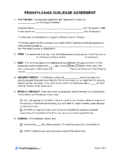 Sublease Agreement – An agreement that lets an individual rent out their leased space to a sub-tenant. Sublease Agreement – An agreement that lets an individual rent out their leased space to a sub-tenant.
|
Disclosures (1)
Lead-Based Paint Disclosure – Under Federal law, any home constructed before 1978 may contain lead-based paint; therefore, the landlord must inform any renter of possible contaminants. The renter must receive a pamphlet about the dangers of lead paint before signing the lease agreement. (EPA/HUD Fact Sheet)
Security Deposit
Maximum Amount – In Pennsylvania, the maximum amount a landlord may charge for a security deposit is 2 months’ rent for a 1-year lease (68 P.S. § 250.511.1(a)) and no more than 1 month’s rent for a 2-year or longer lease. (68 P.S. § 250.511.1(b))
Returning to Tenant – The landlord is responsible for returning the security deposit within 30 days of the lease end.
Collecting Interest – For any security deposit larger than $100 and held in escrow for over two years, the sum must be placed in an interest-bearing account, with the interest paid back to the renter annually. (68 P.S. § 250.511.2(b))
Itemized List Required – If the security deposit has been deducted for damages, a list must be prepared and given to the tenant within 30 days of the lease end date. (68 P.S. § 250.512(a))
Separate Bank Account – Any security deposit larger than $100 must be kept in an escrow account. (§ 250.511.2(a))
Landlord Access
General Access – While there are no laws prohibiting a landlord from entering a tenant’s dwelling, it is advised that a 24-hour notice is given. (Consumer Guide to Tenant and Landlord Rights (p.9))
Emergency Access – There are no Pennsylvania laws concerning emergency access of a landlord.
Paying Rent
Grace Period – No law states a grace period for late rent, so the rent is due on the due date. The landlord may issue a 10-day notice to quit or pay rent. (68 P.S. § 250.501(b))
Maximum Late Fee – No specific laws state whether there is a maximum late fee for late payment. The late fee is suggested to be covered in the original lease agreement.
Returned Checks (NSF) – The maximum amount a landlord may charge a tenant for writing a bad check is $50. (18 P.C.S. § 4105(e)(3))
Reasons for Eviction (4)
Leaving Before the End Date – There are no mentions of early property abandonment by a tenant in the state of Pennsylvania.
Lockouts – Locking out a tenant is prohibited in the state of Pennsylvania unless they receive a court order. (§ 250.503)
Non-Compliance – Tenants must comply with the lease agreement or may be served a 15-day notice to quit or a 30-day notice to quit if the lease lasts longer than one year. (§ 250.501(b))
Non-Payment of Rent – Failure to pay the rent on time may result in a landlord issuing a 10-day notice to quit or pay rent. (§ 250.501(b))
